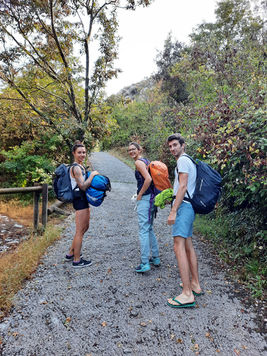
Über mich
Ich war schon immer offen und neugierig, stets auf der Suche nach neuen Erfahrungen. Routine und Wiederholung langweilen mich schnell – deshalb habe ich im Laufe der Jahre oft meine Hobbys und Karrierewege gewechselt. Früher wurde mir nachgesagt, ich würde nichts langfristig durchziehen. Und doch bin ich heute, mehr als 10 Jahre nach meinen ersten Kletterversuchen, immer noch mit voller Leidenschaft dabei.
Nun erfülle ich mir endlich meinen Traum: meine eigene Kletterschule. Es bereitet mir große Freude, meine Leidenschaft, Erfahrung und mein Wissen mit anderen zu teilen. Hier kann ich all die Fähigkeiten, die ich über die Jahre sowohl persönlich als auch beruflich gesammelt habe, nutzen, um andere auf ihrem Kletterweg zu unterstützen.
Seit 2018 bin ich zertifizierte Sportklettertrainerin und habe in den letzten Jahren wertvolle Erfahrung in verschiedenen Kletterhallen in Österreich gesammelt.
Zusätzlich habe ich durch meine Arbeit mit Climb Istria und Flyrama wertvolle Praxiserfahrung im Unterrichten von Felsklettern gesammelt.
„Warum solltest du mich als deine Trainerin oder deinen Guide wählen?“ – Um diese Frage zu beantworten, ziehe ich die Zitate meiner Kund*innen heran:
Kurz gesagt: Wenn ich drei zentrale Eigenschaften nennen müsste, die mich ausmachen und dir einen Eindruck davon geben, was dich beim Klettern mit mir erwartet, dann wären es diese:
-
Authentizität – Ich lege Wert auf eine offene und ehrliche Atmosphäre, in der du dich wohlfühlst und gleichzeitig über dich hinauswachsen kannst.
-
Volle Präsenz – Am Fels bin ich mit voller Aufmerksamkeit bei dir. Du hast meine ungeteilte Unterstützung, damit du das Beste aus jeder Klettersession herausholen kannst.
-
Sicherheit durch klare und ruhige Kommunikation – Deine Sicherheit steht für mich an erster Stelle. Ich vermittle Anweisungen klar und gelassen, damit du dich ganz aufs Klettern konzentrieren kannst – in dem Wissen, dass du in guten Händen bist.
Sportklettern ist für mich weit mehr als nur ein Sport – es ist ein Werkzeug, um Herausforderungen im Leben zu meistern. Genau aus diesem Grund habe ich meine Masterarbeit in Sozialarbeit diesem Thema gewidmet. Falls du neugierig bist, kannst du hier die Zusammenfassung meiner Masterarbeit lesen.
Abstract
"The roots of sports social work can be traced back to the U.S. settlement movement that began around 1900. Since then, sport has experienced a steady upward trend in the psychosocial field and sportive methods constantly gained recognition. In the 1980s, sport-related measures started to become systematically implemented in social work. Today, sports social work is an established term in scientific discourse. Nevertheless, the criticism of the inadequate methodological justification and the lack of conceptual fundamentals is not unfounded. This master thesis therefore tries to establish the medium of climbing for social work on a professional level through a methodological and theoretical foundation. First, the classical methods of social work are explained and cross connections to climbing are shown. For the concrete methodological justification of climbing as a medium, the concept of empowerment and life coping, as well as the method of experiential education are used. This thesis focuses on the competencies that can be acquired through climbing that can be used by social work clients to successfully cope with the challenges of everyday life. Based on selected climbing-specific practical examples, possible conceptual foundations in different areas are addressed. Following the comprehensive discussion of the potential of climbing as a medium, barriers are identified that make the use of the medium difficult. These include the problem of funding on an individual and institutional level, the necessary extraordinarily high level of qualification of the person providing instructions, and the negative effects of exaggerated pressure to perform in climbing. Based on the elaboration, recommended actions for social work on different levels are suggested to contribute to the establishment of climbing as a medium in social work."









